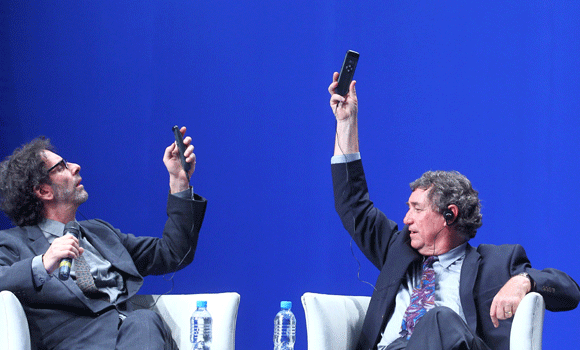Joel Coen talks shop with Chinese filmmakers
Updated: 2011-11-18 10:41
By Raymond Zhou (China Daily)
|
|||||||||
|
 |
|
Joel Coen (left) and David Fanning interact at the US-China Forum. |
What do the Coen Brothers think of the Chinese remake of their debut feature Blood Simple, the 2009 Zhang Yimou comedy known in English as A Simple Noodle Story or A Woman, a Gun and a Noodle Shop?
One audience member shot the question at Joel Coen, who was attending a film directors' panel discussion of the US-China Forum on the Arts and Culture in Beijing. It was something almost every film buff in China was anxious to find out.
Joel, the elder half of the Coen duo, was diplomatic. "I loved it," he blurted out.
Then he proceeded to define why he "liked" the Chinese version. "It was the single weirdest viewing experience," he said.
At first he felt it was strange that Zhang Yimou had bothered to ask them for the rights to remake the movie, he said. He could not detect many similarities between the original and the remake. Then, as the story unfurled, he recognized the narrative arc.
Joel Coen seemed conflicted about what Zhang did. Protecting intellectual property is "a fine line", he said. However, he didn't squirm about how Zhang picked whatever elements the latter deemed necessary to make it his own. Artists, Coen said, "should be open to absorbing influences from all the places".
Responding to another question about his relationship with Hollywood, Coen explained that, "The American film industry is quite broad, with different facets to it, which allows myself and my brother to make the kind of movies we make."
He said they do not have much contact with Hollywood. "A certain amount of healthy distance from the industry is necessary," he said. But "we have been lucky to generate finance for our movies".
Coen asked Chinese director Lu Chuan about how movies are financed in China, and was told that funding came mostly from State-owned studios before the new millennium, and since then the private sector is a major player.
He recalled the time when he and his brother Ethan used a Super 8 camera to make home movies.
They were aware of the technique of juxtaposing two narrative lines but did not know how to use parallel editing. As a result, they shot the two parallel scenes in sequence and developed the film in a drugstore.
Nowadays, anyone with an iPhone can point and shoot and "have the camera run forever, or have endless retakes", then use software to edit the footage.
But Coen emphasized the importance of learning the craft.
Perhaps to the disappointment of many Chinese in the audience, he did not launch into a tirade against Hollywood as the establishment and how independent filmmakers like him carved out a niche by doing things differently. Instead, he placed more emphasis on the craft aspect of moviemaking.
"Robins always sing the same song," he quoted Bernardo Bertolucci as saying, and elaborated that one has to constantly think about how to make a scene work and convey all the things he wants to get across to the audience.
Sometimes, he employs special techniques.
At the beginning of Fargo, the credits claim it is a true story. Coen admitted this was just a ploy to calm the audience. "None of what happened in the movie is true," he laughed.
But audience members might not have the patience to find out because the lead character appears very late in the film.
Lu Chuan's Kekexili: Mountain Patrol, however, offers another case. The details are fictional, but the whole story is based on truth. The film gains much of its emotional power from a documentary look and feel.
On the other hand, American documentary maker David Fanning called his art "the most manipulative form" as the editor can put a quote any place in a film and create a different impact.
Chinese director He Ping said his movies are all fictional, but "the creators have to feel they are true. They have to be convinced of the emotional honesty of the story".
He attributed the gap between Chinese filmmakers and the rest of the world to certain restrictions they have to face in terms of subject matter and other things.
"Chinese artists carry a heavy burden," he said. "They cannot do everything they want to do."
But if one decides to tell a story on screen, "it should move people".
Coen, having watched some of Zhang Yimou's and Lu Chuan's work, was more optimistic about Chinese cinema as a whole.
"It is on a cusp, both quantitatively and qualitatively," he said. "It's going to evolve."











